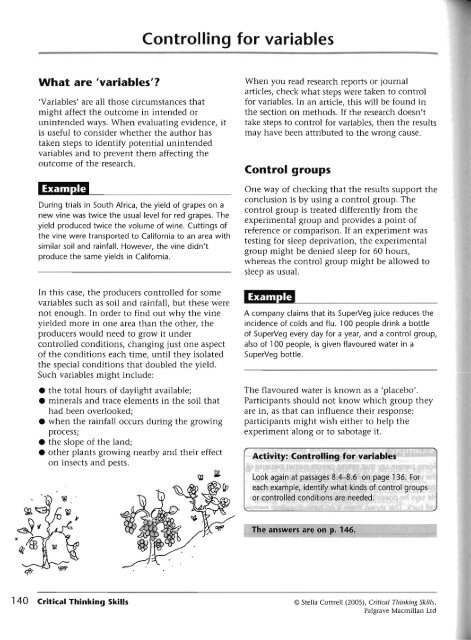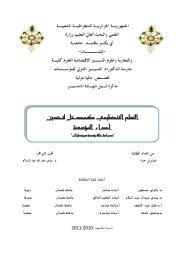Critical Thinking Skills - Developing Effective Analysis and Argument(2)
Critical Thinking Skills - Developing Effective Analysis and Argument(2)
Critical Thinking Skills - Developing Effective Analysis and Argument(2)
You also want an ePaper? Increase the reach of your titles
YUMPU automatically turns print PDFs into web optimized ePapers that Google loves.
Controlling for variables<br />
What are 'variables'<br />
'Variables' are all those circumstances that<br />
might affect the outcome in intended or<br />
unintended ways. When evaluating evidence, it<br />
is useful to consider whether the author has<br />
taken steps to identify potential unintended<br />
variables <strong>and</strong> to prevent them affecting the<br />
outcome of the research.<br />
During trials in South Africa, the yield of grapes on a<br />
new vine was twice the usual level for red grapes. The<br />
yield produced twice the volume of wine. Cuttings of<br />
the vine were transported to California to an area with<br />
similar soil <strong>and</strong> rainfall. However, the vine didn't<br />
produce the same yields in California.<br />
In this case, the producers controlled for some<br />
variables such as soil <strong>and</strong> rainfall, but these were<br />
not enough. In order to find out why the vine<br />
yielded more in one area than the other, the<br />
producers would need to grow it under<br />
controlled conditions, changing just one aspect<br />
of the conditions each time, until they isolated<br />
the special conditions that doubled the yield.<br />
Such variables might include:<br />
the total hours of daylight available;<br />
minerals <strong>and</strong> trace elements in the soil that<br />
had been overlooked;<br />
when the rainfall occurs during the growing<br />
process;<br />
the slope of the l<strong>and</strong>;<br />
other plants growing nearby <strong>and</strong> their effect<br />
on insects <strong>and</strong> pests.<br />
When you read research reports or journal<br />
articles, check what steps were taken to control<br />
for variables. In an article, this will be found in<br />
the section on methods. If the research doesn't<br />
take steps to control for variables, then the results<br />
may have been attributed to the wrong cause.<br />
Control groups<br />
One way of checking that the results support the<br />
conclusion is by using a control group. The<br />
control group is treated differently from the<br />
experimental group <strong>and</strong> provides a point of<br />
reference or comparison. If an experiment was<br />
testing for sleep deprivation, the experimental<br />
group might be denied sleep for 60 hours,<br />
whereas the control group might be allowed to<br />
sleep as usual.<br />
A company claims that its SuperVeg juice reduces the<br />
incidence of colds <strong>and</strong> flu. 100 people drink a bottle<br />
of SuperVeg every day for a year, <strong>and</strong> a control group,<br />
also of 100 people, is given flavoured water in a<br />
SuperVeg bottle.<br />
The flavoured water is known as a 'placebo'.<br />
Participants should not know which group they<br />
are in, as that can influence their response:<br />
participants might wish either to help the<br />
experiment along or to sabotage it.<br />
Look agair I at passagc :S 8.4-8.6 on page 136. For<br />
each exam ~ple, identil y what kin ds of contr ol groups<br />
or controlled conditions are nee ded.<br />
-<br />
We' ariswers~ml~.<br />
-----.. - "- .. ,. .=.-<br />
- IU<br />
140 <strong>Critical</strong> <strong>Thinking</strong> <strong>Skills</strong> O Stella Cottrell (ZOOS), <strong>Critical</strong> Tlliiikir~g<strong>Skills</strong>,<br />
Palgrave Macmillan Ltd



